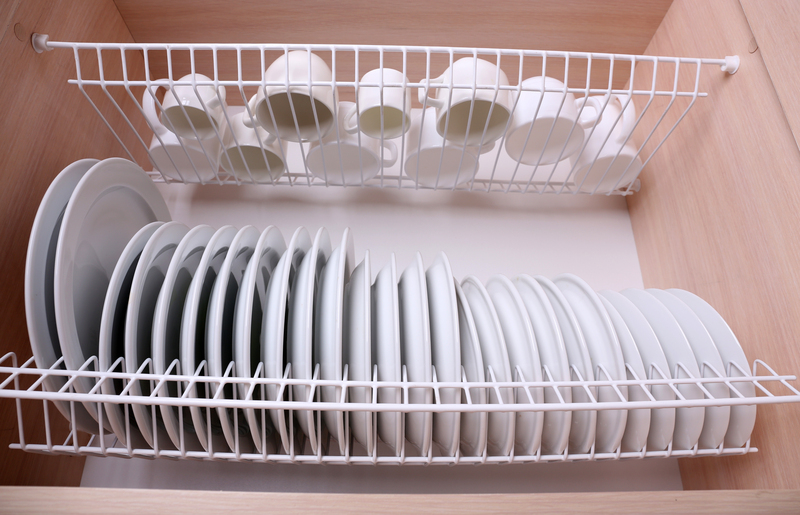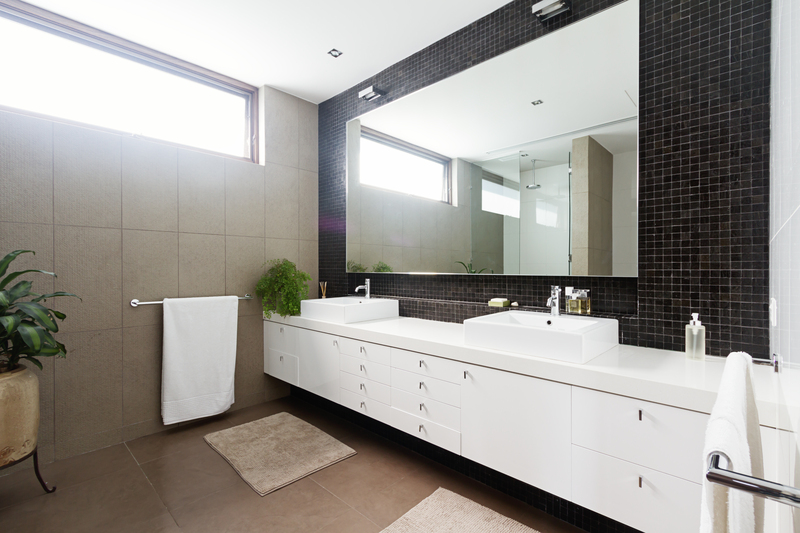Say Goodbye to Pet Smells in Your Home
Posted on 07/09/2025
Say Goodbye to Pet Smells in Your Home: The Complete Guide
If you're a pet owner, you know that keeping your home fresh and free from pet odors can be a constant challenge. From the beloved pup's muddy paws to the cat's little accidents, pet smells can linger and make your home less inviting. Fortunately, taking some smart steps can help you eliminate pet odors for good. In this comprehensive guide, you'll learn how to banish pet smells and enjoy a clean, welcoming environment--no matter how many furry friends you have!

Understanding the Source of Pet Odors
The first step to removing pet smells from your home is understanding where they come from. Pet odors are caused by a combination of fur, dander, urine, feces, saliva, and even pet foods. These can settle into carpets, fabrics, floors, and air vents.
- Urine and feces: Accidents can happen, especially with young, elderly, or untrained pets. Without prompt cleanup, these leave behind persistent odors.
- Dander: Dead skin cells and fur from shedding pets can collect in hidden places and contribute to musty smells.
- Saliva: Dogs in particular leave saliva on toys, bedding, and furniture, which can quickly turn malodorous.
- Pet bedding and toys: These items absorb smells over time and act as reservoirs for stinky scents.
Why Say Goodbye to Pet Smells?
Persistent pet odors are more than just unpleasant--they can also impact your home's indoor air quality, make guests uncomfortable, and even reduce your property's value when it comes time to sell or rent. By removing pet odors, you'll create a cleaner, healthier, and more inviting space for everyone who steps through your door.
Effective Methods to Eliminate Pet Smells From Your Home
Ready to eliminate pet smells from your home? These actionable strategies will help you tackle odors at the source and keep your space smelling fresh.
1. Clean and Vacuum Regularly
Pet fur and dander are major sources of odor. Make vacuuming a top priority:
- Use a vacuum with a HEPA filter to trap pet hair and allergens.
- Focus on carpets, rugs, and upholstered furniture where odors tend to accumulate.
- Vacuum at least twice a week, or more often if you have multiple pets.
For hard floors, sweep and mop often. Use enzymatic cleaners for deep cleaning, as these break down odor-causing organic materials rather than simply masking them.
2. Wash Pet Bedding, Blankets, and Toys Frequently
Pet beds and toys can harbor strong smells. Make it a habit to wash all washable pet items weekly in hot water with a fragrance-free, pet-safe detergent. This removes fur, dander, and bacteria that contribute to odors.
3. Target Urine and Feces Accidents Immediately
Prompt cleanup makes all the difference. If your pet has an accident on carpets or floors, blot up as much as possible, then use an enzymatic cleaner specifically designed for pet stains. These cleaners break down urine crystals and eliminate lingering smells better than traditional cleaning methods.
4. Deep Clean Carpets and Upholstery
Sometimes, vacuuming isn't enough to remove entrenched pet odors from carpets and furniture. Hire a professional steam cleaning service or rent a carpet cleaner every few months. Baking soda is also a fantastic DIY deodorizer--sprinkle liberally on affected areas, let sit for several hours or overnight, then vacuum away.
5. Bathe and Groom Your Pets Regularly
Clean pets mean a clean home. Bathe your dog or cat according to breed and vet recommendations. Brush fur frequently--this reduces shedding and helps control dander. For cats, keeping the litter box clean (scooping daily and changing litter weekly) is crucial for odor control.
6. Improve Air Circulation and Purification
- Open windows regularly to let fresh air in and odors out.
- Use air purifiers with true HEPA and carbon filters to trap allergens and odors.
- Consider using dehumidifiers, especially in damp areas. High humidity intensifies smells.
7. Use Safe Deodorizers and Natural Remedies
While it might be tempting to mask odors with sprays, opt for natural solutions instead:
- Baking soda: Absorbs odors on carpets and upholstery. Sprinkle, let sit, and vacuum.
- Vinegar: Mix a solution of one-part vinegar to two parts water for a safe, natural cleaning spray.
- Activated charcoal: Place in small bowls or bags around the home to absorb smells.
8. Maintain the Litter Box
If you have a cat, litter boxes can be the main culprit of bad smells. Use these tips:
- Scoop at least once per day.
- Change clumping litter weekly, or as recommended by the manufacturer.
- Wash the box with warm soapy water during litter changes.
- Consider covered or self-cleaning boxes for better odor control.
Pet Smell Removal for Different Surfaces
Different surfaces require different techniques to remove pet odors effectively:
Hard Floors (Wood, Tile, Laminate)
- Wipe up any accidents immediately.
- Mop with a mild, pet-safe cleaner. For stubborn odors, use a little vinegar diluted in water.
Carpets and Rugs
- Blot up moisture from accidents immediately.
- Apply an enzymatic pet odor remover to treat the area according to manufacturer directions.
- For old stains, repeat cleaning and allow areas to dry thoroughly.
Upholstery and Curtains
- Vacuum regularly to remove hair and dander.
- Wash, steam, or dry clean according to care instructions.
- Use baking soda on cushions--let sit, then vacuum.
Walls and Baseboards
- Wipe down with a solution of water and vinegar or gentle all-purpose cleaner.
- Inspect for sprayed urine or drool and clean promptly to prevent odors from soaking in.
How to Keep Pet Smells Out for Good
The best way to eliminate pet odors for good is consistent prevention. Follow these daily and weekly routines to prevent smells from returning:
- Groom pets regularly to reduce shedding.
- Wipe paws when your dog comes inside to reduce dirt and mud tracked indoors.
- Keep a cleaning kit handy for accidents, including paper towels, enzymatic cleaner, and disposable gloves.
- Refresh bedding and litter boxes on a schedule that works for your home.
- Encourage your pets to use their designated areas. Positive reinforcement goes a long way for house training.
- Address health issues with your veterinarian if your pet is having frequent accidents or smells unusually strong.
Best Products to Help You Eliminate Pet Odors
Not sure which products actually work to get rid of pet smells? Here are some top recommendations, vetted by pet owners and cleaning experts:
- Enzymatic cleaners: Such as Nature's Miracle or Rocco & Roxie, which are formulated for pet stains.
- HEPA air purifier: Like the Dyson Pure Cool or Levoit Core series for cleaner indoor air.
- Pet-safe carpet shampoo: Dirt Devil, Bissell, or Hoover solutions designed for homes with animals.
- Baking soda carpet deodorizer: Look for Arm & Hammer or make your own mix with a few drops of essential oil (pet-safe only).
- Odor-absorbing gels: Such as Gonzo or Fresh Wave, which neutralize smells with natural ingredients.
Natural Remedies for Pet Smell Removal
If you prefer eco-friendly and non-toxic solutions, natural products can make a big difference in your battle against pet odors.
- Baking Soda: This classic absorbs smells and can be sprinkled on most surfaces.
- White Vinegar: Great for cleaning hard surfaces and neutralizing urine odors.
- Activated Charcoal: Absorbs heavy pet odors when placed in small bags around the home.
- Lemon Juice: Natural deodorizer, but use sparingly (and only in areas pets can't access, as citrus exposure can irritate some pets).
- House Plants: Some (like Boston fern and spider plant) help purify air naturally, but check for pet safety before adding new plants.
Common Mistakes That Make Pet Smells Worse
Avoid these pitfalls, which can exacerbate pet odors instead of removing them:
- Masking odors with sprays or candles: This only covers the smell, it doesn't solve the root problem.
- Using ammonia-based cleaning products: Ammonia smells like urine to pets, so it can encourage repeat accidents.
- Allowing accidents to sit: The longer stains are left, the harder they are to clean and the more odors will embed.
- Neglecting areas pets love to hide: Odors can accumulate under beds, behind couches, or in laundry piles.

When to Call in Professional Help
While most pet smell removal can be handled with diligence and the right products, some situations may require professional intervention:
- Severe, long-standing pet odors that won't respond to DIY methods.
- Deep cleaning after multiple accidents in one spot.
- Prepping your home for sale or a new tenant.
Professional cleaning services have access to industrial equipment and professional-grade products that can restore carpets, floors, and upholstery to fresh-smelling condition.
Conclusion: Make Your Home Fresh and Pet-Friendly
Living with pets doesn't mean you have to accept lingering odors. By following the tips in this guide--from regular cleaning routines to using the best pet odor eliminators--you can banish pet smells once and for all. Remember, consistency is key: the more you stay on top of cleaning, the less odors will embed in your home. Your family, guests, and even your pets will appreciate your efforts to create a clean, welcoming, and fresh-smelling home.
Say goodbye to pet smells in your home today and enjoy all the love and joy your furry friends bring--without any of the unwanted odors!




